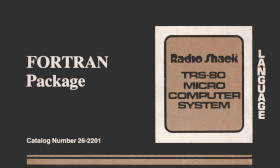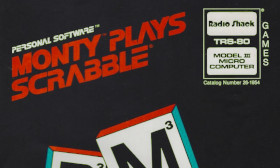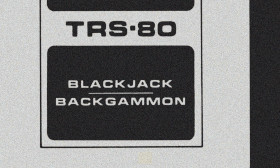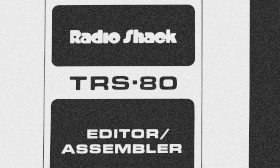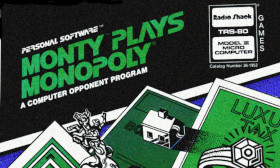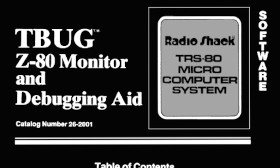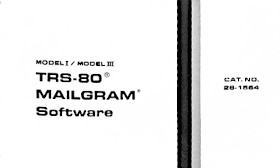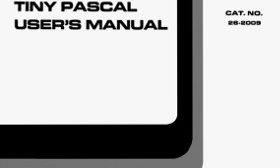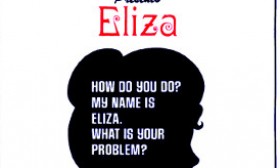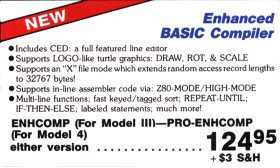Articles in the "Software" Category
Microsoft FORTRAN, also known as FORTRAN-80, was one of the most advanced programming tools available for the TRS-80. As a compiled language, it was more powerful than the included BASIC interpreter. Microsoft FORTRAN was created and sold by Microsoft for multiple TRS-80 models, although the most popular versions were sold directly by Radio Shack. Many commercial TRS-80 programs, such as The Mean Checkers Machine by Lance Miklus, were written in FORTRAN. Miklus wrote in the March 1980 issue of The S-Eighty:
FORTRAN’s advantages are numerous: it’s fast, the coding technique is protected, it has powerful library functions, it is an excellent number cruncher, its functions are complete subroutines instead of single lines, and it interfaces easily with machine language subroutines.
(Read more...)
Monty Plays Scrabble (catalog number 26-1954) by Ritam Corporation of Fairfield, Iowa was a sequel to their earlier Monty Plays Monopoly. It cost $34.95 and was released in 1982 for the 32K disk TRS-80 Model III. Ritam also sold a version of Monty Plays Scrabble for the Apple II. Other than color, the Apple II version was nearly identical to the TRS-80 version.
Like Monty Plays Monopoly, Monty Plays Scrabble was a “computer opponent program” allowing up to four people to play Scrabble against their computer. Unlike it, Monty Plays Scrabble was officially licensed by Selchow and Righter Co., the Scrabble trademark holder at the time. (The manual identifies the title of the game as “Monty Plays the SCRABBLE Brand Crossword Game.")
(Read more...)
By 1979, the TRS-80 Model I was regarded as having the largest software library of any microcomputer on the market. But when the Model I was introduced in 1977, it had only five pieces of software available. Only one of those was bundled with the computer: Blackjack/Backgammon, also known as Game Package.
Radio Shack’s original August 1977 press release for the TRS-80 mentioned that “a variety of game programs will be available, including blackjack and backgammon.”
(Read more...)
The TRS-80 Editor/Assembler (catalog number 26-2002), better known as EDTASM, was an assembly language programming tool for the cassette TRS-80 Model I. It was introduced in 1978 and cost $29.95. EDTASM was such a common tool that its name (and associated file format) became a kind of shorthand for TRS-80 assembler.
EDTASM was written by Mark Chamberlin of Microsoft and licensed to Radio Shack. A Radio Shack catalog stated:
Microsoft, an industry leader in systems software, has developed this program … so you can expect the ultimate in editing features.
(Read more...)
Monty Plays Monopoly was a “computer opponent program” that allowed a TRS-80 owner to play the popular Monopoly board game. There were two TRS-80 versions of Monty Plays Monopoly:
- The original 1980 version by Ritam Corporation of Fairfield, Iowa, which was available for the 16K cassette and 32K disk Model I. This version was distributed by Personal Software. (Personal Software, later renamed VisiCorp, was better known for their VisiCalc spreadsheet.) Ritam also sold a version for the Apple II for both cassette and disk.
- Ritam Corporation also licensed Monty Plays Monopoly through Personal Software to Tandy Corporation. This version (catalog number 26-1952) cost $34.95 and was released in 1982. It was only available for the 32K disk Model III. This is the most common TRS-80 version.
Unlike later Monopoly programs, Monty Plays Monopoly wasn’t designed to replace the board game but to supplement it. In fact, it requires “the board and all the equipment that comes with the game”, according to the manual.
(Read more...)
T-BUG (catalog number 26-2001), also known as TBUG, was a machine language monitor and debugger for the TRS-80 Model I. It cost $14.95 and came on a cassette with separate versions for Level I and Level II BASIC. (The T-BUG debugger shouldn’t be confused with the Tandy Business Users Group, which was also known as T-BUG.)
Described by some as the “standard” TRS-80 debugger, T-BUG provided an inexpensive way for TRS-80 owners to learn about and experiment with assembly language. Most books about TRS-80 assembly language, such as Earles L. McCaul’s TRS-80 Assembly Language Made Simple and William Barden’s TRS-80 Assembly Language Programming, assumed that the reader owned T-BUG.
(Read more...)
TRS-80 Mailgram (catalog number 26-1564) was a software package that allowed sending Western Union Mailgram messages directly from a TRS-80 Model I or Model III. It was introduced in late 1979 and cost $39.95, not including a Western Union account (which cost an additional $50.00) and per message fees.
The Mailgram service was introduced by Western Union in 1970. Mailgram worked by transferring digital messages to a location closer to the recipient, printing them out, and then mailing them using the postal mail. The process was described this way in a Western Union advertisement from a 1972 Life magazine:
Just call a number shown below (toll-free from most phones). Western Union will transmit your message electronically to a post office near your addressee. And the next business day your Mailgram will be delivered by regular letter carrier.
(Read more...)
Tiny Pascal, also known as “Tiny” Pascal, was a popular programming language for microcomputers. It was created by Kin-Man Chung and Herbert Yuen in 1978 and first described in a three-part series of articles published in BYTE. There were at least four different versions of Tiny Pascal for the TRS-80, although the version sold by Radio Shack was the most popular.
Tiny Pascal was a subset of the programming language Pascal. It contained most of the features of Pascal but was small enough to run well on a cassette-based TRS-80. Tiny Pascal was often used to teach Pascal programming and the Radio Shack catalog described it as a “great introduction to structured programming.”
The first version of Tiny Pascal appeared in a three-part series of articles in BYTE titled “A ‘Tiny’ Pascal Compiler.”
(Read more...)
Eliza (catalog number 26-1908), also known as Talking Eliza, was a TRS-80 Model I and Model III implementation of Dr. Joseph Weizenbaum’s famous ELIZA program. It was introduced by Radio Shack in 1979 for a price of $14.95. Eliza was written by Robert A. Arnstein and was licensed to Radio Shack through his company, Device Oriented Games. One unusual feature of the program was its ability to speak its responses using Radio Shack’s TRS-80 Voice Synthesizer, hence the name Talking Eliza.
The original ELIZA program was created by Dr. Joseph Weizenbaum. He described it in an article “ELIZA – A Computer Program For the Study of Natural Language Communication Between Man and Machine” that was published in the Communications of the ACM in January 1966:
(Read more...)
EnhComp was a BASIC compiler written by Philip Oliver for the TRS-80 Model III and Model 4. (Longtime TRS-80 users probably remember Philip Oliver for his excellent game
Scarfman.) Oliver wrote two versions of EnhComp: the original published by the Cornsoft Group of Indianapolis, Indiana in 1980 and the more popular second version (whose full name was the Enhanced BASIC Compiler Development System) sold by MISOSYS of Sterling, Virginia starting in 1986. Unlike most other TRS-80 BASIC compilers (such as Simutek’s ZBASIC), EnhComp wasn’t primarily focused on compatibility with interpreted BASIC but on providing a new enhanced version of BASIC.
(Read more...)
